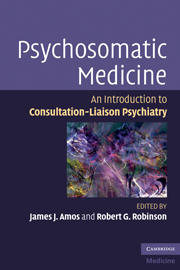
- Cited by 3
-
Cited byCrossref Citations
This Book has been cited by the following publications. This list is generated based on data provided by Crossref.
Dao, Melissa Dominicé and Kirmayer, Laurence J. 2014. Cultural Consultation. p. 313.
Sutarta, I. Putu Candra S. Ardani, I. Gusti Ayu I. Aryani, Luh Nyoman A. Windiani, I. Gusti Ayu T. Adnyana, I. Gusti Ngurah S. and Setiawati, Yunias 2022. Psychological and Behavioral Factors Associated with Cyclic Vomiting Syndrome: Case Report. Open Access Macedonian Journal of Medical Sciences, Vol. 10, Issue. C, p. 32.
Elyasi, Forouzan Heydari, Fatemeh and Haddadi, Kaveh 2023. Quetiapine‐induced chest wall edema with the swellings of face and extremities in a young hospitalized patient: A case report. Clinical Case Reports, Vol. 11, Issue. 7,
- Publisher:
- Cambridge University Press
- Online publication date:
- August 2010
- Print publication year:
- 2010
- Online ISBN:
- 9780511776878
- Subjects:
- Psychiatry and Clinical Psychology, Medicine, Psychiatry


